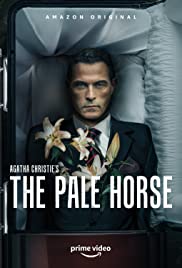
THE PALE HORSE
UK, 2020, 116 minutes, Colour.
Rufus Sewell, Kaya Scodelario, Georgina Campbell, Kathy Kiera Clarke, Sean Pertwee, Sheila Atim, Bertie Carvel, Rita Tushingham, Henry Lloyd- Hughes.
Directed by Leonora Lonsdale.
The Pale Horse is the fifth adaptation of an Agatha Christie story by prolific English writer for television, Sarah Phelps (50 episodes of East Enders, adapting Dickens and JK Rowling as well). They are very much 21st-century adaptations of Agatha Christie, letting go of the author’s general restraint in describing characters and plots. In fact, many aspects of the adaptations could be considered sensationalist. While some reviewers and the public applauded these adaptations, the majority of Agatha Christie fans were not pleased. This was especially the case with The ABC Murders, with John Malkovich as Poirot – and the hypothesis that he was a parish priest in Belgium, rather than a police chief, disenchanted with German murder of his parishioners and so coming to England.
The Pale Horse was published in 1961 and echoes the atmosphere of the times in its characters and some supernatural elements of plot. There is a focus here on witches, fortune-telling, the witches and their curses and deaths. There is also some scepticism about this belief in the supernatural, especially by one of the characters responsible for some of the deaths.
At the centre is Rufus Sewell, an antiques dealer, covering up the accidental death of his wife, marrying again, been preoccupied with memories of his first wife’s death, a list being found of people who were to die, a question mark behind his name. And then there are the three witches (with Rita Tushingham as the old which). There is also a police Inspector played by Sean Pertwee.
While Rufus Sewell is at the centre, a shopkeeper played by Bertie Carvel turns out to be a very human character, responsible for deaths rather than witchcraft. The ending, after the portrayal of the central character as tormented, having nightmares, fantasies, consulting the witches to lift the curse, is rather ambiguous as to his final state.
1. An Agatha Christie story? From the early 1960s? This 21st-century adaptation? The alteration of characters, situations? The strong criticism from fans?
2. The early 1960s, London, the streets, cars, homes? Shops? The visit to the village? The hotel, The Pale Horse? The musical score?
3. The element of the supernatural? The popularity on novels and films of the period? Witchcraft? Superstitions? Fortune-telling?
4. Dreams, fantasies, fears, nightmares? The interchange between reality and nightmares? The mystery of the ending?
5. The situation, the dying woman, her list, the names, the question mark after Mark? The women? Ardingly? Osborne?
6. The focus on Mark Easterbrook? Antique dealer? His own personality? Marrying Delphine? His suspicions, cross-examining her, her electrocution? His covering up? The police inspector, the discussions, the suspicions? His marrying Hermia? The relationship with her? Suspicions, animosity? His relationship with Thomasina? Her death? The death of the woman with the list? Hair falling out? His discussions with David Ardingly? The encounters with Zachariah Osborne? The insinuations about the women? Witches? Their power, violence, being paid?
7. The image of the three witches, the fortune-telling for Delphine? The ominous presence? Perceived by Mark? The insinuations about their power? At The Pale Horse, in the village? Their presence at the funeral? Influence on the dead woman? Mark going to visit them, wanting them to lift the curse, his memories, their effect, not wanting to see him again?
8. Ardingly, his aunt, arranging her death, his greed? The connection with the witches? Information? Mark confronting Ardingly in the basement?
9. The inspector, his suspicions, interrogations? His collapse, seen in the hospital, his death? The influence of the witches? The poisoning by Osborne?
10. The continuous presence of Osborne, his manner, connection with Mark? Intimations about the witches? The revelation of his malevolence? The poisoning?
11. Hermia, her character, vanity, clothes, suspicions of Mark, drugs? Her collapse? Hospital, the recovery?
12. Mark, the effect of these experiences, on his character, the memories of Delphine’s death, the discussions with the inspector, the interactions with Hermia, thinking that she hated him, wanted his death? The malevolence of Osborne?
13. The ambiguity of the ending – and the fans being critical of the ending and its seeming confusion?